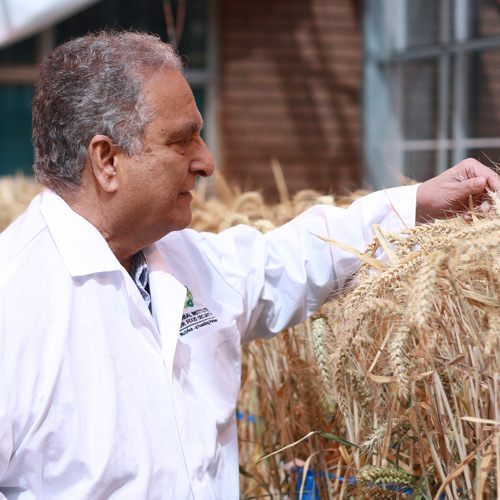Raju Datla, Senior Scientist, Global Institute for Food Security


Raju Datla is a senior scientist and program lead in resilient agriculture at the Global Institute for Food Security (GIFS), a partnership between Nutrien, the Government of Saskatchewan and the University of Saskatchewan (USask). Raju grew up in India and moved to Saskatoon, SK, in 1985. He took a research officer position as staff scientist with the National Research Council of Canada (NRC) in 1993. He holds a master’s degree in plant embryology and genetics, and a PhD in plant genetics and evolution.
Where did you work before GIFS?
I worked at the NRC Saskatoon as a research officer in the Plant Biotechnology Institute. I was a principal research officer at NRC before I joined GIFS as a senior scientist in December 2019.
What got you interested in this area of work?
It was through my research activities and their key discoveries from performing basic and foundational research in model crop plants. I saw opportunities to translate some of those findings into solutions for performance and productivity challenges in crops. That’s what interested me, translating expertise and discoveries into (maybe) a professional stream. Although it is a long process, you can make impactful contributions, especially working and collaborating with other experts.
Tell us a bit about what you’re working on at GIFS.
The mission of GIFS is to work with partners to discover, develop and deliver innovative solutions for the production of globally sustainable food. With climate change being a major influencer on agriculture, one thing we are looking at in our research is water conservation and if we can make crops that are more adaptive or resilient to those changes.
Another aspect we are looking at is increasing the efficient use of fertilizers by crops. Our research is focused on how to make plants more efficient users of nutrients, especially nitrogen and phosphate in Canada.
To address and capture some of these challenging opportunities, we focused on identification and characterization of gene targets associated with resiliency and crop productivity traits.
Our research findings led to the development of the “Targeting reproductive and spike traits for improving grain yields in wheat” project. We have identified opportunities in this program for discovery of new genes controlling spike developmental programs (characteristics) to improve the wheat grain yield potential.
This project is funded by Manitoba Crop Alliance, Saskatchewan Wheat Development Commission and Alberta Wheat Commission. We are into the third year of this project and our current focus is on discovery and characterization of genes controlling the spike development, the major reproductive part of the wheat crop, and if we can increase its capacity. We are trying to determine if there is any flexibility and diversity available in the germplasm that we can use to increase the number of grains that can be produced in a spike.
We have developed some candidate lines that can produce more grains, but these are at the early stages and are being controlled and studied in greenhouse conditions.
Eventually, we will be able to identify molecular markers and the underpinning genes that control these spike traits. That is the pipeline for this research, to facilitate incorporation of the desirable spike traits conferring improved grain yields to develop advanced Canadian wheat breeding lines.
We are connected with Canadian wheat breeders, as our discovery and characterization establishment progresses for capturing translational potential to the project’s research findings.
What can you say about the value of farmers providing funding and support to your organization?
Farmers are giving us the funding to be able to do these types of research projects. This funding is helping us discover and develop outcomes that will benefit farmers. It enables us to explore challenging research questions. The continued support from farmers helps us identify what they see on the farm, what they are looking for and/or what challenges they may be facing. There is such a benefit from their knowledge, experiences and support.
How does that farmer funding and support directly benefit farmers?
In this particular project, we are dealing with wheat, a very important part of Canadian agriculture, both for its quality and recognition globally. If we can improve wheat yields, that could not only positively impact farmers’ returns, but it could directly impact Canadian agriculture. Farmers would benefit from yield-boosting gene technologies and improved productivity in this crop will positively impact global food security.
How do you spend your time outside of work?
I like to play sports – tennis is my favourite.
What are you excited about for the future of your sector/agriculture?
We are living in very exciting times. There are technological advances happening across multiple disciplines, and they are happening very rapidly. There are more opportunities, but challenges continue to emerge. I think we will continue to get better at advanced technological and biological understanding, positioning us well to take on more challenging tasks to improve climate adaptive sustainable agriculture productivity.
